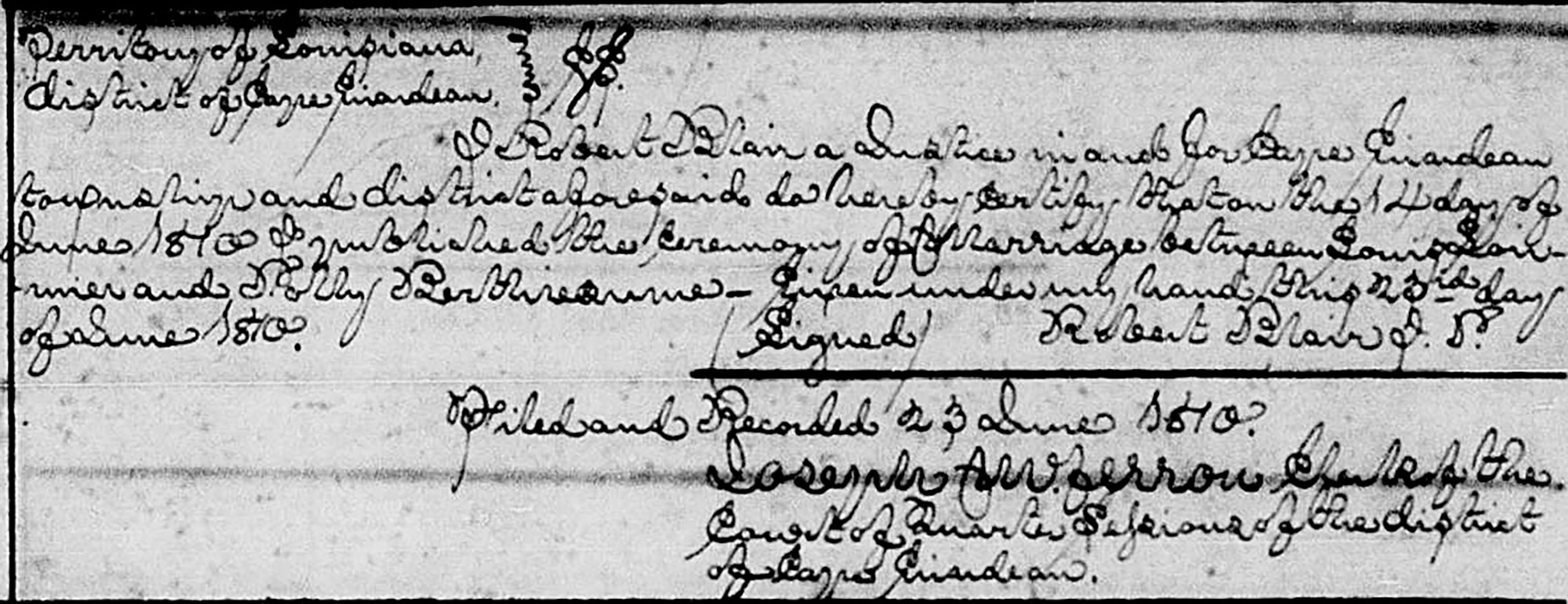Settling Louis Lorimier's estate: His widow Marie and son Manuel
Explore the complex saga of Louis Lorimier's estate, involving his widow Marie, son Manuel, and a tangled web of claims and legal battles that spanned over a decade.
The children of Cape Girardeau's founder, Louis Lorimier, included Guillaume/William, his natural son with an unknown mother, and Louis Jr., Auguste B., Maria Louisa, Agatha, Verneuil Raphael, Victor and Lizette (who died young) born to his wife Charlotte Pemanpieh. Rarely, writings mention his youngest son Manuel, born to his second wife Marie.
Lorimier wrote his will "being on the Point to undertake a distant journey and considering the uncertainty of human life ..." on March 12, 1808, naming his seven surviving children and his wife, Pemanpieh, as heirs. Unfortunately, his wife was either already ill or became ill within days and died on March 23. Two years later, on June 23, 1810, he married Marie "Polly" Berthiaume, daughter of Francois Berthiaume. Berthiaume lived on the north side of Apple Creek on a grant of about 780 acres he had mortgaged to Lorimier. This grant appears on maps of Perry County as Survey No. 1845, and its confirmed area is 640 acres.
Before March 1813, Marie gave birth to Manuel. Lorimier died June 26, 1812, without having written another will or providing a codicil to his 1808 will. Under the law, however, Marie and his young son inherited part of his estate. Lorimier's son-in-law, Daniel F. Steinbeck, was executor of the will, and began the huge task of settling the estate. Sometime between Lorimier's death and Dec. 13, 1814, Marie remarried to John Logan. Logan was an Irish immigrant who came from Ohio to Missouri with his parents and siblings. After his marriage, he purchased the Berthiaume land, still encumbered with the mortgage.
The initial effort to settle Marie's claim on Louis Lorimier's estate was for Steinbeck and the other heirs to pay the Logans $8,000 to quit claim in their share on Dec. 13, 1814. This came in the form of $4,720 in cash and personal property, and $3,280 in slaves and forgiveness of the mortgage Francois Berthiaume Sr. had taken with Lorimier.
Apparently, this failed to clear their claim. Sadly, Manuel Lorimier died, probably sometime in 1821. The Logans retained a lawyer, Gustavus A. Bird, of Ste. Genevieve to prosecute their claim in return for one-third of all their share. Marie claimed dower rights (one-third of the estate during her lifetime), property stipulated in a marriage contract (which failed to survive) and her share as sole heir of her deceased son. The Logans initiated probate for Manuel Lorimier's estate in Cape Girardeau County in August 1822, but the process remained incomplete. Marie Logan's name appears on no document after December 1822.
The end of the Lorimier estate settlement concerning Marie Logan and her son, Manuel, occurred when John Logan sold their shares to Steinbeck, representing the Lorimier heirs, for $10,000 on Aug. 13, 1823. This sum is equivalent to about $300,000 in 2024. No signature by Marie appears on this deed, suggesting her death. John Logan moved across the river to Jackson County, Illinois, at about this time, where he remarried.
Bill Eddleman, Ph.D. Oklahoma State University, is a native of Cape Girardeau County who has conducted genealogical research for over 25 years.
Connect with the Southeast Missourian Newsroom:
For corrections to this story or other insights for the editor, click here. To submit a letter to the editor, click here. To learn about the Southeast Missourian’s AI Policy, click here.











